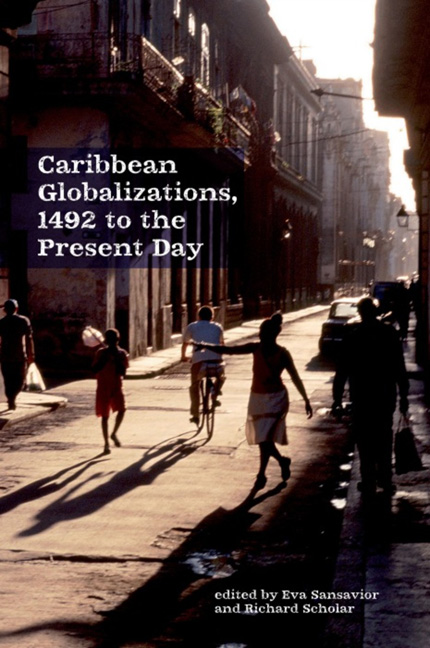Book contents
- Frontmatter
- Contents
- Contributors
- Prologue: Globalization, Globality, Globe-Stone
- Introduction
- I Globalizations in the Making
- II The Complex Present
- 6 Tobacco: The Commodification of the Caribbean and the Origins of Globalization
- 7 The Amaranth Paradigm: Amerindian Indigenous Glocality in the Caribbean
- 8 Aluminium: Globalizing Caribbean Mobilities, Caribbeanizing Global Mobilities
- 9 Race and Modernity in Hispaniola: Tropical Matters and Development Perspectives
- 10 Local, National, Regional, Global: Glissant and the Postcolonial Manifesto
- 11 Tropical Apocalypse: Globalization and the Caribbean End Times
- Acknowledgements
- Index
11 - Tropical Apocalypse: Globalization and the Caribbean End Times
from II - The Complex Present
- Frontmatter
- Contents
- Contributors
- Prologue: Globalization, Globality, Globe-Stone
- Introduction
- I Globalizations in the Making
- II The Complex Present
- 6 Tobacco: The Commodification of the Caribbean and the Origins of Globalization
- 7 The Amaranth Paradigm: Amerindian Indigenous Glocality in the Caribbean
- 8 Aluminium: Globalizing Caribbean Mobilities, Caribbeanizing Global Mobilities
- 9 Race and Modernity in Hispaniola: Tropical Matters and Development Perspectives
- 10 Local, National, Regional, Global: Glissant and the Postcolonial Manifesto
- 11 Tropical Apocalypse: Globalization and the Caribbean End Times
- Acknowledgements
- Index
Summary
What time is the Caribbean in? Is it behind the rest of the world, or ahead of it? Is it a reminder of the past of the rest of the world—a prelapsarian site of memory—or is it a harbinger for the globalizing world that contains in its history and present reality prophecies of times to come? One could argue that it is both: that it is at once decades behind the developed world according to the measures usually applied to gauge the stage of economic and social development, and years ahead of it, in perhaps less apparent ways. One of these less obvious markers of the Caribbean's ‘advanced’ stage of development lies broadly in its culture, the hybrid, creolizing forms that are taken by some to be precursors to the models that appear to be forming in parts of Europe and other zones made up of rapidly changing populations, the products of the mass migrations that are a salient feature of globalization in the twenty-first century. ‘Le monde se créolise’, Glissant (1995: 15) writes in a well-known phrase that suggests that the world is catching up with the Caribbean in its cultural, economic, and social formations. Glissant does not, however, mean that in the creolizing world every cultural creation can be termed creole. Rather, such creations become ‘surprising, complicated and inextricably linked to other cultures’. The creolization of the world, he writes, ‘is the creation of an open and inextricable culture, and it fashions itself in every domain, music, visual arts, literature, cinema, cuisine, at a vertiginous pace’ (cited in Joignot, 2011: 27).
This chapter is concerned with another feature of Caribbean history and culture that may similarly be interpreted in terms of a precursor to later developments in the broader, globalizing world. Specifically, the chapter investigates the relationship between the theory and experience of the apocalypse in the globalized present and in Caribbean history. It argues that, to some extent, the apocalyptic reality of the present, globalized world is a reflection of processes and discourses that have long informed Caribbean thought and lived experience, and that these latter may be read as a foreshadowing of the wider world's own movement into apocalyptic understandings of the present time.
- Type
- Chapter
- Information
- Caribbean Globalizations, 1492 to the Present Day , pp. 246 - 266Publisher: Liverpool University PressPrint publication year: 2015



